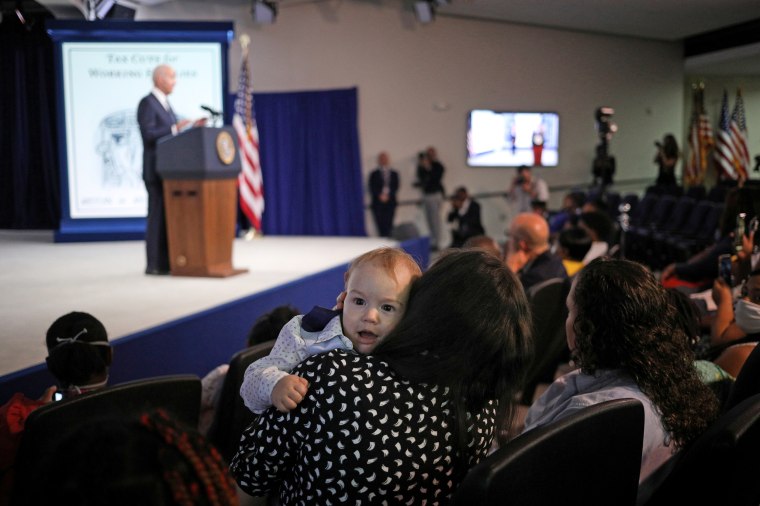WASHINGTON — The last of the child tax credit payments goes out Wednesday unless the Senate can pass President Joe Biden's Build Back Better legislation before the new year and send it to his desk for his signature.
Ten days before Christmas, families nationwide are receiving their last checks as part of the expanded monthly child tax credit payments. Without the passage of Biden’s $1.75 trillion economic plan, the monthly payments will expire and the child tax credit will revert to its much smaller pre-pandemic level.
"Parents are heading into the new year with no idea whether they’ll be able to put food on the table for their children, keep their babies in clean diapers, or pay rent to keep a roof over their family’s heads," said Patricia Cole, senior director of federal policy at the child advocacy group Zero to Three.
The American Rescue Plan, enacted in March, increased the existing child tax credit by $3,000 from $2,000 with a $600 bonus for kids under the age of 6 for the 2021 tax year. It also established monthly payments, which began in July and go through December in deposits of $300 for children under the age of 6 and $250 for those aged 6 to 17. The second half will come when families file 2021 tax returns next year.
Since the first payments were disbursed in July, the Treasury Department and IRS have delivered almost $93 billion to families, according to the agency. Within weeks of the first payment in July, the Census Bureau’s Household Pulse Survey data showed that 55 percent of middle-income families spent their payments on food, more than 26 percent spent it on clothes, and 23 percent spend it on costs related to school and afterschool.
The biggest question looming over Capitol Hill as Congress embarks on its final legislative sprint of 2021 is whether the Senate will pass the economic safety net and climate bill. Senators have less than two weeks to meet their self-imposed Christmas deadline and it could all hinge on centrist Joe Manchin, D-W.Va., the linchpin of the 50-50 Senate.
The House passed the Build Back Better Act last month, but the Senate will have to change it to win the votes of all 50 Democratic-voting senators.
House Speaker Nancy Pelosi, D-Calif., on Wednesday, during her weekly news conference, called the payments "essential."
When asked if the House could do a separate bill from Build Back Better to extend the child tax credit payments now, Pelosi said the two couldn't be separated and while it would pass in the House, "whether we could pass it in the Senate remains to be seen."
"But I don't want to let anybody off the hook on BBB to say, 'Well, we covered that one thing' so now the pressure is off," said Pelosi. "I think that that is really important leverage in a discussion on BBB that the children and their families suffer without that payment."
ParentsTogether Action, a family advocacy nonprofit, conducted a survey of its more than 2.5 million members in advance of the final payment.
When asked what would happen to their family’s finances if the payments stopped after this month, 50 percent of respondents said it will be more difficult for them to meet their family's basic needs and 36 percent said they will no longer be able to meet their family’s basic needs.
Bethany Robertson, co-director of ParentsTogether, called on the Senate to vote now on Build Back Better as “millions of families are on the brink."
Pelosi concluded her news conference by saying she was "still optimistic" about passing Build Back Better, and "perhaps even if it were after the first of the year, which I hope it is not, that it could be retroactive if it's early enough in the first of the year."

